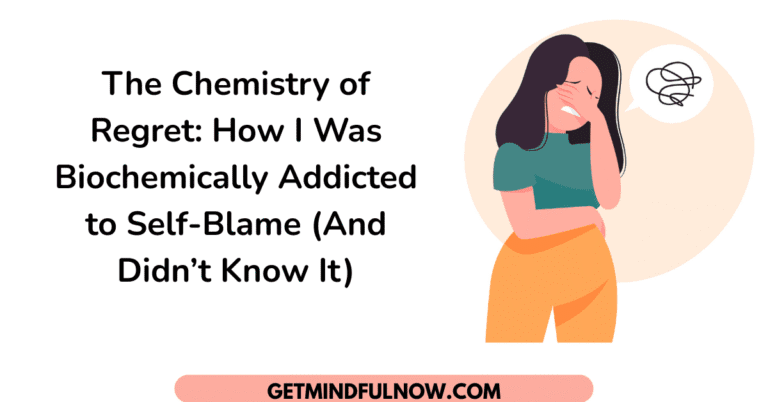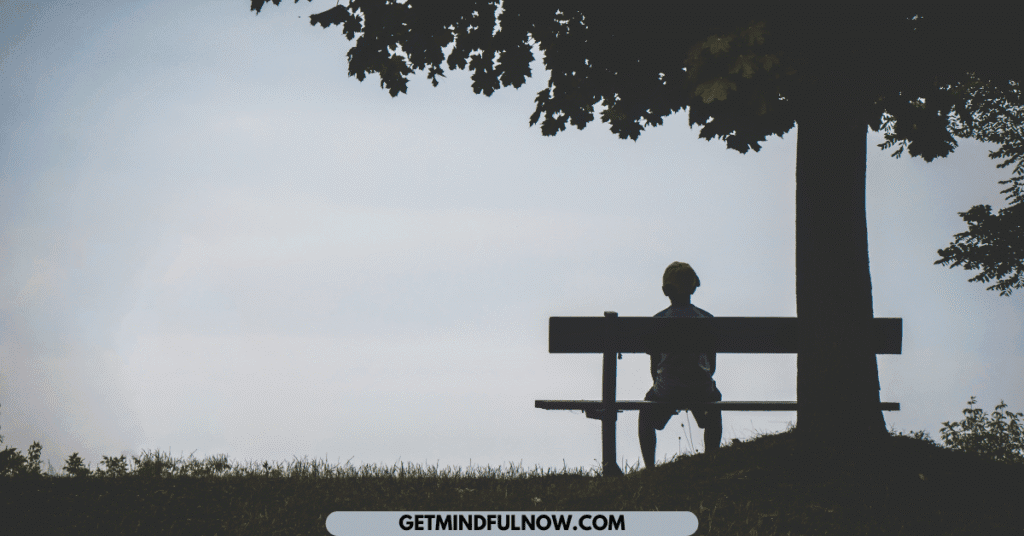I was sitting on my bathroom floor, clutching my pelvic again. Not from food poisoning or cramps, but from that same old ache. The kind that doesn’t come from your body. It comes from your past.
I had just spent half of the day spiraling through another round of: “If I had just done this one thing differently, maybe…”
That’s when it hit me.
This wasn’t a thought. This was an addiction. A loop my body kept pulling me into like it needed the pain to feel normal. Like if I wasn’t regretting something, I didn’t know who I was.
That day, I realized I wasn’t just a girl who overthinks.
I was chemically wired to suffer.
Let’s talk about that.
My Gut Was Screaming Long Before I Was Listening
For years, I had bizarre symptoms in my second energy center, pelvic pain, bloating, hormonal chaos, gut issues I couldn’t solve. I tried everything.
Probiotics. Herbal protocols. Dairy-free, gluten-free, joy-free diets.
I even took antibiotics so strong they could kill a small dragon.
Still, my gut felt like it was at war with me.
But it wasn’t food.
It wasn’t candida.
It wasn’t “just stress.”
It was stored emotion.
See, I didn’t realize that all those years of inner regret, of silently punishing myself for not being lovable enough, not smart enough, not doing enough, were literally creating the chemistry of illness.
Until I came across a sentence from Dr. Joe Dispenza that hit like a spiritual punch to the throat:
“The body becomes so conditioned to the chemical state of a memorized emotion that it does not know the difference between an actual experience and the emotion remembered.”
So basically:
You can relive trauma without anything traumatic actually happening.
Just think the same painful thought.
Your body will flood with the same neurochemicals.
And that chemistry?
Becomes your baseline.
I was biologically addicted to regret.
Emotional addiction is real. And it’s chemical.
let me say this, this isn’t woo-woo. It’s neurochemistry.
this is what happens when you live in emotional pain long enough:
- Your brain signals the hypothalamus to make peptides, tiny chemical messengers, that match the emotion you’re feeling (let’s say guilt, shame, regret).
- Those peptides flood your body and bind to receptors on your cells. Over time, your cells build more receptors for that emotion because it’s what they’re used to receiving. It’s like they crave it.
- Now here’s the twist. When you try to change, think better thoughts, feel better feelings, your body throws a tantrum. It’s like withdrawal. You feel “off” without your usual emotional hit.
This is why we stay in toxic relationships.
Why we keep repeating the same mistakes.
Why we say, “I’ll never let that happen again”, and then… it does.
Not because we’re weak.
But because we’re chemically wired to stay the same.
Regret became my identity
There’s a strange comfort in pain that’s familiar.
Regret gave me control. If something bad happened, at least I could blame myself and feel powerful in the suffering. That’s the emotional addiction talking.
And it shows up in the most subtle ways:
- Thinking other people’s abandonment means you failed somehow
- Over-apologizing even when you’ve done nothing wrong
- Ruminating on every conversation like you’re on trial
- Beating yourself up for not being “more healed” already
I wasn’t just regretting the past.
I was regretting the present.
And pre-regretting the future.
The day I saw it all in real-time (and everything cracked open)
There was this one afternoon, I was sitting, doing nothing particularly intense, and out of nowhere, I caught my thoughts spiraling:
“You should have started healing sooner.”
“You wasted years.”
“You’ll never get the love from your blood relations you wanted.”
It wasn’t loud.
It wasn’t dramatic.
But it was… observed.
I saw it happen.
Noticed the chemical ache in my belly.
Felt my breath get shallow.
Watched the regret bloom in my cells like a weed I had been watering for decades.
That moment of watching myself think is called metacognition.
And that’s the golden key.
It’s the only thing that makes us human.
It’s the work of the frontal lobe, the CEO of change, the only part of our brain that can interrupt the limbic system and say:
“Hey. That’s not who we are anymore.”
When you become conscious of an unconscious pattern, it starts to lose power.
When you bring your frontal lobe online, you break the loop.
That moment changed me.
Not because I “fixed” anything.
But because I witnessed the machinery of my suffering in real-time.
And once seen, it can’t stay hidden.
I had to feel it to release it
This wasn’t about just “thinking positive” or doing another morning affirmation in front of a mirror that still scared me.
I had to feel the damn regret.
Sit with it.
Let it burn.
Through shadow work, deep meditation, and good old crying-into-a-EFT sessions, I started identifying the exact emotions stuck in my second energy center:
- Shame
- Betrayal
- Loneliness
- Hopelessness
- And the deepest one: I should’ve been better
I didn’t “heal” them like a checklist.
I witnessed them.
And that witnessing was the medicine.
Each time I released an emotion, a physical symptom eased.
Not just in theory, literally. My gut pain reduced. My digestion normalized. Even my hormonal swings calmed down.
But the gut dysbiosis stuck around like an uninvited guest at a healing party.
Until one day, during another spiral of self-blame, it clicked:
The emotion I hadn’t fully faced yet?
Regret itself.
Regret was feeding my gut issues
There’s research now that shows how the gut, our “second brain”, has receptors for emotional peptides.
Your gut isn’t just digesting food.
It’s digesting your emotional life.
Every time I flooded my system with regret, my gut literally tightened.
It shifted microbial balance.
Created inflammation.
Blocked healing.
Not because the herbs weren’t working.
Because my body didn’t feel safe to let go of the chemistry it knew best.
This is why chronic gut issues don’t always respond to diet or supplements alone.
Because sometimes the problem isn’t in your food, it’s in your emotions.
Meditation: The practice that turns the lights back on
You can’t override emotional addiction with logic.
You need to rewire your entire internal operating system.
And that starts with meditation.
I’m not talking about sitting cross-legged with spa music.
I’m talking about the kind of deep inner work that trains your brain to watch itself.
Because meditation increases blood flow to the prefrontal cortex, the part of your brain responsible for metacognition, decision-making, long-term vision, focus, concentration, and identity.
Most people are living with barely any frontal lobe activity.
It’s like walking around self-lobotomized.
We react, we repeat, we replay what hurt us, on autopilot.
But when you meditate? You interrupt that.
You stop living by the hormones of stress.
You create coherence in the brain and body.
You teach your body that it’s safe to feel new emotions.
Over time, meditation stops being a “self-care thing” and becomes neurological rehabilitation.
Because you’re not just changing your thoughts.
You’re changing your brain chemistry.
And that changes everything.
You don’t have to keep living the same emotional story
The chemicals of your emotions don’t define you.
They follow you, but they don’t own you.
You are not your regret.
You are the one who sees it.
When you realize that, you don’t have to fight your old patterns.
You just stop identifying with them.
And that changes the entire biology.
Neuroscience shows us that when we fire new thoughts, we wire new brain connections.
And when we stop feeding the old ones, they literally wither.
It’s called synaptic pruning.
Think of it like emotional gardening.
You don’t have to keep watering the roots of regret just because they’re familiar.
You get to plant something else.
Final Thoughts (And a Loving Slap of Truth)
If your life feels like a loop, like no matter how much you grow, you keep attracting the same heartbreak, same rejection, same gut punch, it’s not because you’re broken.
It’s because your body is still addicted to how those emotions feel.
But you don’t have to keep replaying that script.
You don’t have to stay trapped in the chemistry of your past.
Your nervous system isn’t your enemy.
It just learned survival patterns.
You’re the one who gets to teach it something new.
And that starts the moment you see it.
Not fix it.
Not affirm over it.
Just… witness it.
Because awareness changes everything.
Want More Truth Like This in Your Inbox?
If this blog cracked something open in you, I’d love to walk this healing journey with you.
👉 Subscribe to my newsletter for raw insights, deep science, and healing tools that actually work
👉 Follow me on Threads for bold takes, personal confessions, and brain-changing wisdom
You’re not alone in this work.
And you’re not crazy.
You’re just waking up.
And that’s the beginning of everything.









F*ckin’ remarkable issues here. I am very glad to see your post. Thanks a lot and i am having a look forward to contact you. Will you please drop me a mail?